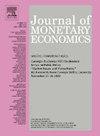人们如何看待工资和物价上涨?
IF 4.3
2区 经济学
Q1 BUSINESS, FINANCE
引用次数: 0
摘要
利用 2014 年第四季度至 2023 年第二季度加拿大消费者预期调查的家庭层面数据,我们研究了工资增长预期及其与通胀预期之间的联系。我们记录了有关工资增长预期及其不确定性的新事实。家庭将更高的工资增长与更强劲的经济联系在一起。工资预期与通胀预期之间的联系较弱,但在高通胀时期,在劳动力市场趋紧的情况下,在新员工中,在工资涨幅高于通胀或教育或收入水平较高的工人中,这种联系更强。工资收益的不确定性与预期通胀的不确定性呈强烈的正相关,尤其是在高通胀时期。本文章由计算机程序翻译,如有差异,请以英文原文为准。
How do people view wage and price inflation?
Using household-level data from the Canadian Survey of Consumer Expectations over 2014Q4–2023Q2, we study wage growth expectations and their link with inflation expectations. We document novel facts about wage growth expectations and the uncertainty around them. Households associate higher wage growth with a stronger economy. The link between wage and inflation expectations is weak, but stronger during the high-inflation period, in tighter labour markets, among new hires, for workers with above-inflation wage gains or higher levels of education or income. Uncertainty about wage gains is strongly positively linked to uncertainty about expected inflation, particularly during the high-inflation period.
求助全文
通过发布文献求助,成功后即可免费获取论文全文。
去求助
来源期刊

Journal of Monetary Economics
Multiple-
CiteScore
7.20
自引率
4.90%
发文量
90
审稿时长
74 days
期刊介绍:
The profession has witnessed over the past twenty years a remarkable expansion of research activities bearing on problems in the broader field of monetary economics. The strong interest in monetary analysis has been increasingly matched in recent years by the growing attention to the working and structure of financial institutions. The role of various institutional arrangements, the consequences of specific changes in banking structure and the welfare aspects of structural policies have attracted an increasing interest in the profession. There has also been a growing attention to the operation of credit markets and to various aspects in the behavior of rates of return on assets. The Journal of Monetary Economics provides a specialized forum for the publication of this research.
 求助内容:
求助内容: 应助结果提醒方式:
应助结果提醒方式:


